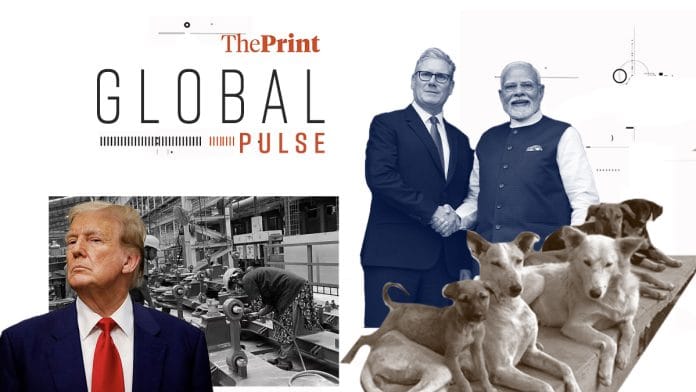New Delhi: The announcement of “punishing tariffs” amounting to 50 percent has left Indian industry in “panic mode”, as they scramble to deal with what could be devastating losses, report Chris Kay, Krishn Kaushik and Andres Schipani in the Financial Times.
According to rating agency Moody’s, “if the 50 percent rate sticks beyond 2025, the yawning tariff gap with the rest of Asia would ‘severely curtail’ India’s manufacturing ambitions and even prompt some foreign direct investors to pull out of the country,” says the report, highlighting what this could mean for Prime Minister Narendra Modi’s Make-in-India push.
“It’s been insane—at 50 percent tariff there is no business to be done,” Sivaramakrishnan Ganapathi, managing director of Gokaldas Exports, a garment manufacturer who supplies retailers, like Abercrombie and Fitch, and Walmart, is quoted as saying. “In the interim, brands are saying they’ll scale down their sourcing from India . . . they have options to go to Vietnam, Bangladesh, Sri Lanka.”
It is difficult to believe that it was only a few months ago that Trump and Modi stood side-by-side in the US, “projecting optimism as they pledged to lift bilateral trade to $500bn by 2030”. The relationship has since spiraled and Trump’s economic imperatives will also upend Modi’s domestic politics, writes Yale University professor Sushant Singh in an opinion piece in Financial Times.
“Modi, whose exaggerated claims of foreign policy achievements and strongman image—anchored in his supposed personal rapport with leaders like Trump—have been integral to his political standing among India’s middle-class, now faces withering domestic criticism. The opposition Indian National Congress party labelled him ‘Narendra Surrender’ for yielding to pressure from Trump. US-backed Hindu nationalist groups, politically vital for Modi, feel jettisoned by Trump’s attacks on India,” the article reads.
The present rupture in India-US ties has roots in history. Both countries also have to grapple with a “half-century of misaligned interests”, writes Amit Seru, a senior fellow at the Hoover Institution and professor of finance at the Stanford Graduate School of Business, in The Washington Post. “India tilted toward the Soviet Union after independence in 1947, not for ideology alone but for survival,” he writes. And even after India liberalised its economy in 1991, ties with the US remained relatively frosty.
“Today, the pieces are in place for something better, if both sides stop looking over their shoulders. India is no longer a slow-moving socialist state but a $3.7 trillion economy brimming with tech talent and geopolitical ambition. There is little doubt about the direction India has chosen. Yet that path comes with a hedging strategy: friend to Russia for defense, energy ties with Iran and deepening links with Israel. And when it comes to the US, the relationship still feels oddly transactional,” he writes.
Meanwhile, Modi’s FTA with the UK has meant “unprecedented access” for the latter. About 40,000 “high-value tenders” are up for auction in the UK in a range of strategic sectors––”transport, green energy and infrastructure”––areas which have been “heavily protected from foreign investment”, reports Nikhil Inamdar for the BBC.
It is “far greater” than what India had offered in its earlier agreement with the United Arab Emirates and “sets a new benchmark”, Ajay Srivastava of Delhi-based think-tank Global Trade Research Initiative (GTRI), is quoted as saying.
Global media has also taken note of how the Supreme Court’s ruling on moving street dogs in Delhi NCR to shelters has enraged civil society, and dog lovers are up in arms. Alex Travelli and Suhasini Raj report in The New York Times that there has been “a rash of incidents in which children have been mauled and sometimes killed”, but the court’s order seems “to contradict the Animal Birth Control law, which requires strays to be vaccinated, sterilised and then returned to the places where they had been picked up”.
“But that strategy has not worked, the court found,” the report reads.
“The action proposed by the Supreme Court would require that the city’s free-roaming dogs, which are estimated to number as many as a million, be placed in facilities that even the justices acknowledge are yet to be built and that would need hefty funding to staff and operate,” it adds.
(Edited by Mannat Chugh)
Also Read: Munir-Trump ties ‘blossom’ as Modi-Trump ‘bromance ends’ & ‘chaotic scenes’ at voter fraud protest






